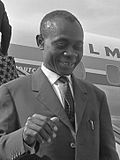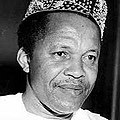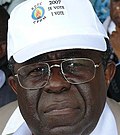 |
|---|
This is a list of prime ministers of Cameroon since the country gained independence from France in 1960 to the present day.
Contents
The current Prime Minister of Cameroon is Joseph Ngute, since 4 January 2019. [1]
 |
|---|
This is a list of prime ministers of Cameroon since the country gained independence from France in 1960 to the present day.
The current Prime Minister of Cameroon is Joseph Ngute, since 4 January 2019. [1]
| No. | Portrait | Name (Birth–Death) | Election | Term of office | Political party | President | ||
|---|---|---|---|---|---|---|---|---|
| Took office | Left office | Time in office | ||||||
| Republic of Cameroon (1960–1961) | ||||||||
| 1 |  | Ahmadou Ahidjo (1924–1989) | — | 1 January 1960 | 15 May 1960 | 135 days | UC | None Himself |
| 2 |  | Charles Assalé (1911–1999) | — | 15 May 1960 | 1 October 1961 | 1 year, 139 days | UC | Ahidjo |
| Federal Republic of Cameroon (1961–1972) | ||||||||
| East Cameroon | ||||||||
| 1 |  | Charles Assalé (1911–1999) | 1964 | 1 October 1961 | 19 June 1965 | 3 years, 261 days | UC | Ahidjo |
| 2 |  | Vincent de Paul Ahanda (1918–1975) | — | 19 June 1965 | 20 November 1965 | 154 days | UC | |
| 3 |  | Simon Pierre Tchoungui (1916–1997) | — | 20 November 1965 | 2 June 1972 | 6 years, 195 days | UC (until 1966) | |
| (3) | UNC | |||||||
| West Cameroon | ||||||||
| 1 |  | John Ngu Foncha (1916–1999) | 1964 | 1 October 1961 | 13 May 1965 | 3 years, 224 days | KNDP | Ahidjo |
| 2 |  | Augustine Ngom Jua (1929–1977) | — | 13 May 1965 | 11 January 1968 | 2 years, 243 days | KNDP (until 1966) | |
| (2) | UNC | |||||||
| 3 |  | Salomon Tandeng Muna (1912–2002) | 1970 | 11 January 1968 | 2 June 1972 | 4 years, 143 days | UNC | |
| United Republic of Cameroon (1972–1984) | ||||||||
| Post abolished (2 June 1972 – 30 June 1975) | ||||||||
| 3 |  | Paul Biya (born 1933) | 1978 | 30 June 1975 | 6 November 1982 (Became president) | 7 years, 129 days | UNC | Ahidjo |
| 4 |  | Bello Bouba Maigari (born 1947) | 1983 | 6 November 1982 | 22 August 1983 | 289 days | UNC | Biya |
| 5 |  | Luc Ayang (1947–2025) | — | 22 August 1983 | 25 January 1984 | 156 days | UNC | |
| Republic of Cameroon (1984–present) | ||||||||
| Post abolished (25 January 1984 – 26 April 1991) | ||||||||
| 6 |  | Sadou Hayatou (1942–2019) | 1992 | 26 April 1991 | 9 April 1992 | 349 days | RDPC | Biya |
| 7 |  | Simon Achidi Achu (1934–2021) | — | 9 April 1992 | 19 September 1996 | 4 years, 163 days | RDPC | |
| 8 |  | Peter Mafany Musonge (born 1942) | 1997 2002 | 19 September 1996 | 8 December 2004 | 8 years, 80 days | RDPC | |
| 9 |  | Ephraïm Inoni (born 1947) | 2007 | 8 December 2004 | 30 June 2009 | 4 years, 204 days | RDPC | |
| 10 |  | Philémon Yang (born 1947) | 2013 | 30 June 2009 | 4 January 2019 | 9 years, 188 days | RDPC | |
| 11 |  | Joseph Ngute (born 1954) | 2020 | 4 January 2019 | Incumbent | 6 years, 284 days | RDPC | |
